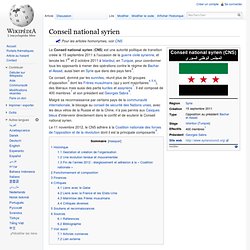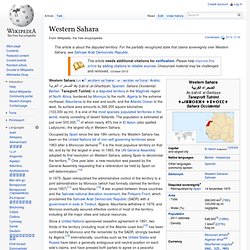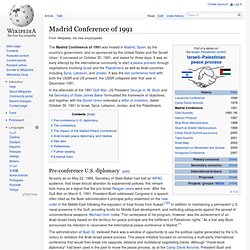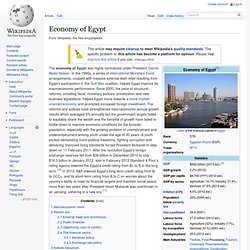

Qatar : un fonds de 50 millions d'euros pour les entrepreneurs de banlieue. Conseil national syrien. Un article de Wikipédia, l'encyclopédie libre.

Pour les articles homonymes, voir CNS. Le Conseil national syrien (CNS) est une autorité politique de transition créée le 15 septembre 2011 à l'occasion de la guerre civile syrienne, et lancée les 1er et 2 octobre 2011 à Istanbul, en Turquie, pour coordonner tous les opposants à mener des opérations contre le régime de Bachar el-Assad, aussi bien en Syrie que dans des pays tiers[2]. Ce conseil, dominé par les sunnites, réunit plus de 30 groupes d'opposition[3] dont les Frères musulmans (qui y sont majoritaires[4],[5],[6]), des libéraux mais aussi des partis kurdes et assyriens[7]. Il est composé de 400 membres[1] et son président est Georges Sabra[8].
Malgré sa reconnaissance par certains pays de la communauté internationale, le blocage au conseil de sécurité des Nations unies, avec les deux vétos de la Russie et de la Chine, n'a pas permis aux Casques bleus d'intervenir directement dans le conflit et de soutenir le Conseil national syrien. Western Sahara. Coordinates: Western Sahara (US i/ˌwɛstərn səˈhærə/; UK /ˌwɛstən səˈhɑrə/; Arabic: الصحراء الغربية Aṣ-Ṣaḥrā’ al-Gharbīyah; Spanish: Sahara Occidental; Berber: Taneẓroft Tutrimt) is a disputed territory in the Maghreb region of North Africa, bordered by Morocco to the north, Algeria to the extreme northeast, Mauritania to the east and south, and the Atlantic Ocean to the west.

Its surface area amounts to 266,000 square kilometres (103,000 sq mi). It is one of the most sparsely populated territories in the world, mainly consisting of desert flatlands. The population is estimated at just over 500,000,[7] of whom nearly 40% live in El Aaiún (also spelled Laâyoune), the largest city in Western Sahara. Occupied by Spain since the late 19th century, the Western Sahara has been on the United Nations list of non-self-governing territories since 1963 after a Moroccan demand.[8] It is the most populous territory on that list, and by far the largest in area.
History[edit] Madrid Conference of 1991. The Madrid Conference of 1991 was hosted in Madrid, Spain, by the country's government, and co-sponsored by the United States and the Soviet Union.

It convened on October 30, 1991, and lasted for three days. It was an early attempt by the international community to start a peace process through negotiations involving Israel and the Palestinians as well as Arab countries including Syria, Lebanon, and Jordan. It was the last conference held with both the USSR and US present; the USSR collapsed later that year in December 1991. In the aftermath of the 1991 Gulf War, US President George H. W. Pre-conference U.S. diplomacy[edit] The administration of Bush Sr. believed there was a window of opportunity to use the political capital generated by the U.S. victory to revitalize the Arab-Israeli peace process.
Secretary Baker made frequent shuttle trips to the region between March and October 1991 in an attempt to find a procedural formula acceptable to all sides. The Nexus and the Olive Tree - By Michael Doran. Henry Kissinger has frequently observed that two of the key challenges of conducting foreign policy are learning to distinguish between urgent and important matters, and then devising techniques to keep the urgent from driving away all consideration of the important.

In other words, the volume of pressing work is so great that officials sometimes fail to answer key strategic questions because they are too busy answering the telephone. With the constant stream of news coming from the Middle East these days, Kissinger's observation is more important than ever. The world -- including, undoubtedly, no small number of U.S. officials -- is currently captivated by the death throes of Muammar al-Qaddafi's regime in Libya. Economy of Egypt. The economy of Egypt was highly centralized under President Gamal Abdel Nasser.

In the 1990s, a series of International Monetary Fund arrangements, coupled with massive external debt relief resulting from Egypt's participation in the Gulf War coalition, helped Egypt improve its macroeconomic performance. Since 2000, the pace of structural reforms, including fiscal, monetary policies, privatization and new business legislations, helped Egypt move towards a more market-oriented economy and prompted increased foreign investment.
The reforms and policies have strengthened macroeconomic annual growth results which averaged 5% annually but the government largely failed to equitably share the wealth and the benefits of growth have failed to trickle down to improve economic conditions for the broader population, especially with the growing problem of unemployment and underemployment among youth under the age of 30 years. Macroeconomic trend[edit] Reform era[edit] Egyptian exports in 2006.